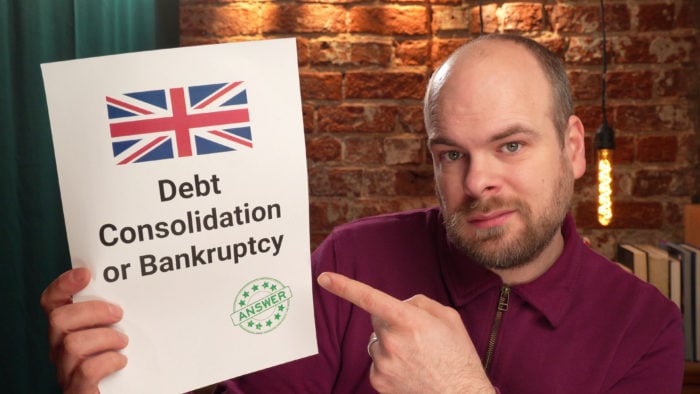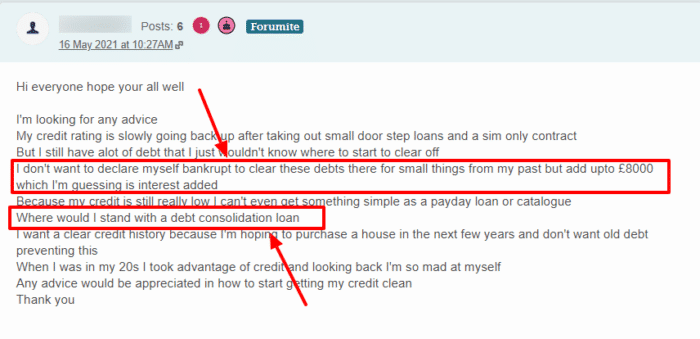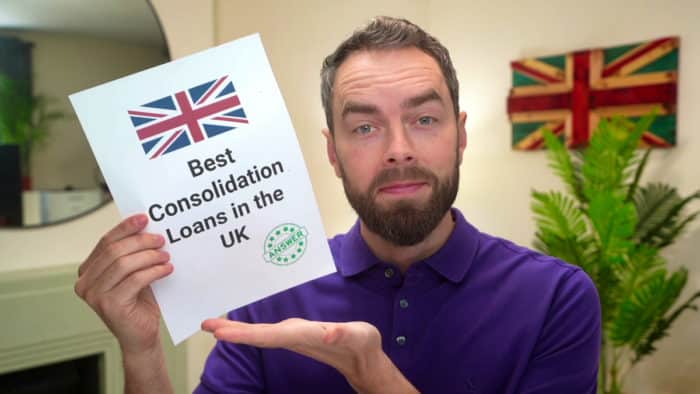Debt Consolidation or Bankruptcy – Which Is Better?

Worried about debts you can’t pay? You’re not alone, and you’re in the right place for answers. Each month, over 170,000 people visit our site for advice on debt solutions.
In this article, we’re going to talk about two options: debt consolidation and bankruptcy. You might be worried about what these can mean for you, but we’re here to help. We’ll explain:
- What debt consolidation is and how it works.
- The good and bad points of debt consolidation.
- What bankruptcy is and how it works.
- The good and bad points of bankruptcy.
- How these two options compare.
Our team has a lot of experience with these topics, so we understand what you’re going through. We’ll help you understand these methods better, so you can choose the best one for you.
There’s always a way to sort out your debts. Let’s get started and learn more about debt consolidation and bankruptcy.
What is bankruptcy?
Becoming bankrupt is an option if you have significant debts that you won’t be able to repay within a reasonable timeframe. Only individuals can become bankrupt in the UK – not companies.
It involves a legal process and ends in a legal status. The end goal of bankruptcy is to write off all the unsecured debts you owe so you can start with a clean slate.
Contrary to what people believe, bankruptcy isn’t permanent. Sometimes bankruptcy comes with a stigma. But it can be the most appropriate and beneficial solution for some people struggling to see a way out of their arrears.
You can petition the court to make yourself bankrupt. You’ll be required to pay a fee to apply for bankruptcy, as well as a court fee and a solicitor fee. All in all, the costs of petitioning for your own bankruptcy are around £700.
A creditor can also try to make you bankrupt. They can only petition to make you bankrupt if you have an unsecured debt that exceeds £5,000. This £5,000 can consist of multiple unsecured debts owed to the same creditor.
What is debt consolidation?
Debt consolidation is a method used to deal with multiple debts by merging them together.
The overall purpose of debt consolidation isn’t just to lump all your debt into one place; it’s primarily used to make debt payments cheaper and more manageable.
How does bankruptcy work?
Bankruptcy in the UK usually works by the individual filing for their own bankruptcy. There isn’t a minimum amount of debt you need to be allowed to file for bankruptcy. As long as you are unable to pay the debt off in a reasonable time, your bankruptcy can be approved.
You apply through the Insolvency Service, which will appoint someone to oversee your case. This person is known as the Offical Receiver within the process.
The bankruptcy will typically last for 12 months, and at the end of this period, all unsecured debts will be written off.
During the 12 months of bankruptcy, the following may happen:
- The Offical Receiver will take control of your bank accounts, which may be closed.
- You won’t be able to take out further credit.
- If you have an income, the Official Receiver could arrange for some of your money to be paid to creditors
- Any businesses you own may be closed
- If you own property or assets, these could be sold to repay creditors
- The bankruptcy will also be made public on a register.
Note that some debts cannot be written off as part of a bankruptcy, including student finance debt. Moreover, some people working in finance and politics will lose their job as a result of being made bankrupt.
How does debt consolidation work?
Debt consolidation works by taking out credit to pay off two or more debts you already have. This is best understood with a simplified example.
Suppose you have three personal loans, each with a balance of £400, giving you a total debt of £1,200. You might then take out a fourth loan for £1,200. You’re approved for the fourth loan and receive a lump sum of £1,200 in your bank account.
You use this new credit to pay off each of your existing loans, clearing all your debt with each of the three lenders. Now you’re left with one larger debt of £1,200 and have essentially merged your debts into one new and bigger debt.
This example has been simplified and doesn’t include fees and other charges which could be applied during the debt consolidation process. The most common charge is an early repayment fee you may have to pay on each loan you pay back earlier than planned.
As the goal of debt consolidation is to save money as well as put all your debt in one place, the interest payments you have to make on the new debt must be less than the accumulative interest payments you were making on the debts you consolidated.
Lender |
APRC |
Monthly payment |
Total amount repayable |
|---|---|---|---|
| United Trust Bank Ltd | 5.99% |
£218.73 |
£26,247.92 |
| Pepper Money | 6.86% |
£220.24 |
£26,429.17 |
| Together | 6.95% |
£220.40 |
£26,447.92 |
| Selina | 7.5% |
£221.35 |
£26,562.50 |
| Equifinance | 7.7% |
£221.70 |
£26,604.17 |
| Spring | 10.5% |
£226.56 |
£27,187.50 |
| Loan Logics | 11.2% |
£227.78 |
£27,333.33 |
| Evolution | 11.28% |
£227.92 |
£27,350.00 |
Representative example: If you borrow £34,000 over 15 years at a rate of 8.26% variable, you will pay 180 instalments of £370.70 per month and a total amount payable of £66,726.00. This includes the net loan, interest of £28,531.00, a broker fee of £3,400 and a lender fee of £795. The overall cost for comparison is 10.8% APRC variable. Typical 10.8% APRC variable.
Search powered by our partners at LoansWarehouse.
Debt consolidation or bankruptcy – which is better?
Debt consolidation is preferable to bankruptcy because it has less serious consequences on your finances, credit score, and immediate future. But this doesn’t mean everyone should choose debt consolidation over bankruptcy.
There may be times when bankruptcy is a more suitable solution to overcome debts and arrears, compared with debt consolidation.
To understand what the right call is for you, it’s important to seek professional guidance. You don’t have to pay for credit counselling or speak with a bankruptcy attorney to find the answers.
You can discuss your debt free by calling Citizens Advice or speaking with a UK debt charity like StepChange.

Debt consolidation, if obtainable, is always preferable to filing for bankruptcy. However, what option you choose will depend on your things like the total debt owed, the type of debt and your financial situation.
What is the difference between debt consolidation and bankruptcy?
Debt consolidation and bankruptcy are two ways to deal with multiple debts, but they are still vastly different.
Debt consolidation is a method that can be achieved on your own by researching your options and following a process. In contrast, bankruptcy is a legal process that goes through the courts.
Bankruptcy is a much more serious method of dealing with debts with greater consequences that can last many years.
Some of the other key differences between debt consolidation and bankruptcy are outlined in the table below.
| Debt Consolidation | Bankruptcy |
|---|---|
| Simplify repayments and potentially reduce interest rates or monthly payment. | Clear most debts, giving a fresh financial start, though at the cost of certain freedoms and assets. |
| May improve credit over time if repayments are made on time, but an initial dip is possible. | Marked on one’s credit file for 6 years and can seriously affect the ability to get credit in the future. |
| Based on the terms of the consolidation loan or plan. | Usually lasts for one year; certain restrictions can apply for longer. |
| Possible loan origination fees or service charges. | Court fees and possibly trustee fees. |
| Often based on credit score, income, and overall debt. | Need to owe at least £5,000 and be unable to repay in a reasonable time. |
| Typically covers unsecured debts like credit cards, personal loans. | Most debts, but not student loans, court fines, and certain other obligations. |
| Future borrowing is potentially possible if you’re showing that you’re managing the consolidated debt well. | Borrowing is restricted during bankruptcy; difficult afterward due to credit file marks. |
| Not a public record, but lenders can see it on a credit check. | Recorded on the Individual Insolvency Register, which is public. |
| No direct protection; might need to use assets (like home) as collateral for some loans. | Assets can be sold to pay off debts. Restrictions on asset acquisition during bankruptcy. |
What are the pros of debt consolidation?
The benefits of using debt consolidation are:
- You can save money on interest payments: By securing a lower interest rate on the new debt, you will save money on the amount of interest you’re paying on your total borrowing. This is the primary reason people choose to consolidate debts, making their debt repayments more manageable.
- Your debt repayments become easier to manage: By merging all your debt into one place with one lender, it’s usually easier to manage your repayments. You’ll now have fewer repayment dates to keep in mind and this should make budgeting for repayments easier.
What is the downside of consolidating debt?
The downsides of debt consolidation are:
- You may have to pay fees and charges: The debt consolidation process may subject you to different fees and charges when paying off loans early and applying for new ones. The most common charge you’ll have to pay is an early repayment charge on the existing debts unless otherwise stated in the terms of your credit agreement with the lender.
- Your home may be put at risk: Most debt consolidation loans offering lower interest rates are a variation of a secured loan. These secured loans require the borrower to list their property or home equity as collateral in the agreement. Thus, you might get a lower interest rate, but you’ll simultaneously be putting your property at risk. It could be forcibly sold if you fail to repay the debt consolidation loan.
Debt consolidation loans and credit cards
In the sections above, we have referred to a debt consolidation loan. This is a loan that is exclusively used to consolidate debts. They might be offered as unsecured or secured loans.
But a debt consolidation loan isn’t the only loan you can use to consolidate debts. You can use any type of loan if you can get approval and the numbers work in your favour. You can use:
- Unsecured loans
- Home equity loans
- Remortgage and extend your borrowing
- Equity release schemes (over 55s only!)
- Balance transfer credit cards
A balance transfer credit card is one of the common ways to consolidate credit card debts. These cards allow the borrower to transfer the balance on other credit cards to the new card, essentially allowing the borrower to pay off existing credit card debts.
Although the borrower will avoid early repayment charges due to the revolving nature of credit on a credit card, they may have to pay a balance transfer fee to move the debt to the new credit card.
Balance transfer cards usually offer an initial period where 0% interest is paid on the balance. This can be lucrative and a great way to save on interest payments while consolidating.
However, it’s important to consider how much interest you’ll pay after this period in case the debt hasn’t been cleared by the time the interest increases.
Can you use a debt consolidation loan for credit card debt?
You can use a debt consolidation loan to pay off multiple credit card debts.
There is nothing stopping you from using a loan, and you don’t have to use a balance transfer card. If you can use a loan, you’ll also avoid paying the balance transfer fee.
You should compare all options to consolidate before making a decision. Taking your time to choose the most advantageous method can save you money.
» TAKE ACTION NOW: Compare deals from the UK’s leading lenders
Does debt consolidation hurt your score?
Does debt consolidation affect credit ratings? Applying for a new loan or credit card can leave a flag on your credit history for other lenders to know that you recently applied for credit.
If you apply for too many loans in a short space of time, you can get rejected for loans for this reason alone.
However, in the long run, debt consolidation is designed to make payments more manageable, resulting in fewer missed or delayed repayments. Therefore, debt consolidation can improve your credit score.
Is debt consolidation the same as Chapter 13?
A USA Chapter 13 bankruptcy does have some similarities to a debt consolidation method. With a Chapter 13 bankruptcy, your debts can be reorganised and consolidated, but this is organised through the courts.
There are some similarities, but they are still different processes.
Getting discharged from bankruptcy
After 12 months, you’ll be discharged from your bankruptcy. At this stage, all unsecured debt included within the bankruptcy gets written off, meaning you no longer owe these debts.
The discharge can be delayed or suspended if you haven’t cooperated with the Official Receiver during the previous 12 months.
If you have been making payments from your income, these can continue for another three years. So, just because you’ve been discharged doesn’t necessarily mean you’ll stop repaying all debts.
Even if some of your assets have yet to be sold by the discharge date, you won’t get them back, and they’ll still be sold.
The Official Receiver has a further three years to take action on a property that has yet to be sold. If no action is taken within three years, they can no longer take control of the property, and it will remain yours.
However, the three-year period is waived if they have already gotten a charging order on the property via the courts.
You can ask for a free letter to show you have been discharged from bankruptcy. But if you need proof to get a mortgage in the future, you’ll need to apply for a special certificate at the cost of £70.
Chapter 7 Vs Chapter 13 bankruptcies
There is a misunderstanding in the UK that an individual can apply for different types of bankruptcies, namely a Chapter 7 bankruptcy or a Chapter 13 bankruptcy. But this is not the case!
Chapter 7 and Chapter 13 bankruptcies are two options for people in the USA. In the UK, there is only one type of bankruptcy available.
How does bankruptcy affect credit?
Bankruptcy can seriously decrease your credit score and will be visible on your credit report for six years. It can be visible for longer if your bankruptcy discharge exceeds this timeframe.
After a bankruptcy discharge, you’ll be legally allowed to apply for other loans and credit cards. However, with bankruptcy on your credit report, it’s unlikely that you’ll get approved.
If you do manage to get approved with a bankruptcy on file, this is more likely to happen if the bankruptcy was many years ago.
Moreover, you’ll probably be restricted on how much you can borrow, and you’ll usually pay a higher interest rate compared to people with a clean credit history.
Debt consolidations loans for all purposes
- Stuck paying high interest on credit card debts & loans?
- Looking for a better interest rate?
- Stuck with the confusion of multiple repayment plans?

Polly
“This was by far possibly one of the nicest experiences I’ve had getting a secured loan.”
Reviews shown are for Loans Warehouse. Search powered by Loans Warehouse.
What is a better option than bankruptcy?
If you don’t want to use bankruptcy to get out of your arrears, you might want to consider a Debt Relief Order (DRO).
To be applicable for a DRO, you must have lived in the UK for the previous three years and have less than £30,000 of unsecured debt.
You cannot get a DRO if you own your own home or other valuable assets. You can retain a vehicle that is worth less than £2,000. Moreover, you must have a low income, with £75 or less disposable income each month.
If a DRO is approved, you are not required to repay any debt for a whole year. Lenders are banned from making contact with you to ask for payments.
If there has been no change to your income after one year, all debts included in the DRO will be written off. This is why a DRO is sometimes considered a softer form of bankruptcy.
Some debts cannot be included in a DRO, such as child maintenance or student finance. But most loans, credit cards, and utility arrears can be included.
How do you get a DRO?
You apply for a DRO with the support of a DRO adviser. The application is sent to the Insolvency Service, the same department that looks after bankruptcy applications. You will have to pay £90 to make the DRO application.
If you don’t want to use a DRO or bankruptcy, you could still consider the following:
- Speak with a debt settlement company.
- Speak with an IVA provider.
- Learn about other debt solutions via debt charities.
Is debt consolidation better than bankruptcy? (Quick recap!)
Debt consolidation is preferable to bankruptcy on average, but it isn’t preferable when personal circumstances indicate that bankruptcy is the better option.
Debt consolidation is usually better because it isn’t as expensive and doesn’t have serious ramifications as bankruptcy. But it’s essential that you make a decision based on your situation, which is possible with the help of UK debt charities.


